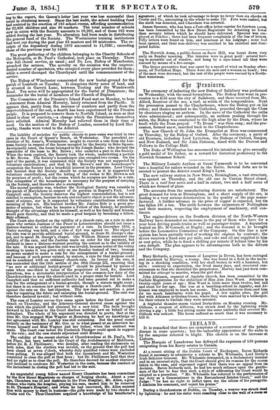(64r Vronium.
The ceremony of inducting the new Bishop of Salisbury was performed on Wednesday, with the usual formalities. The Bishop first went in pro- cession to a field near the city of Salisbury, and there received from Mr. Alford, Receiver of the see, a turf, as seisin of the temporalities. Next the procession passed to the Chapterhouse, where the Bishop put on his robes ; and thence marched to the Cathedral, preceded through the Close by choristers singing an anthem. In the nave of the Cathedral the oaths were administered ; and subsequently, an anthem pealing through the aisles, the Bishop was conducted to the high altar by the Dean, where he knelt while the Dean prayed. "To Deum " was then sung; and the pro- cession, formed anew, marched back to the Chapterhouse.
The new Church of St. John the Evangelist at Eton was consecrated on Thursday, by the Bishop of Oxford. After the ceremony, a party of old Etonians, including Lord Lyttelton, the Bishops of Oxford, Bangor, and New Zealand, and Sir John Patteson, dined with the Provost and Fellows in the College Hall.
The Duke of Wellington has announced his intention to give annually a gold medal of his father, as a reward for historical proficiency in the Norwich Grammar School.
The Military Lunatic Asylum at Great Yarmouth is to be converted into a hospital for sailors wounded in the Baltic. Several forts are to be erected to protect the district round King's Lynn.
The new railway station in New Street, Birmingham, a vast structure, was opened on Thursday, and the old one in Curzon Street closed. There is a roof four acres and a half in extent, two and a half acres of which are formed of glass.
The accounts from the manufacturing districts are satisfactory. The great demand for iron at Birmingham, and a short supply of the ore, is leading to a very serious deterioration in the quality of the pigs manu- factured. A further advance in the mice of copper is expected, but tin has fallen 10/. a ton. The strife between the carpenters of Nottingham and their masters, respecting the employment of machinery, still con- tinues.
The engine-drivers on the Southern division of the North-Western Railway have demanded an increase in the pay of those who have for a year been driving goods-trains as well as passenger-trains. A deputation waited on Mr. M'Connell, at Rugby ; and the demand is to be brought before the Locomotive Committee of the Company. On this line a new system has been partially tried of working the engines by contract ; the driver receives a fixed sum per mile, and coke and oil are supplied to him at cost price, while he is fined a shilling per minute if behind time by his own default. The plan appears to be advantageous both to the drivers and the Company.
Mary Richards, a young woman of Langtree in Devon, has been outraged and murdered by Harvey, a tramp. She was found in a field in the morn- ing in a shocking condition, with her skull beaten in with a hammer, but alive : contrary to expectation, she lived many days, and recovered con- sciousness so that she identified the perpetrator. Harvey had just been com- mitted for attempt to murder, when the girl died.
John Atkinson, organist of Appleby church, has been committed by the Carlisle Magistrates for the abduction of Miss Ann Jane Ward. Atkinson is twenty-eight years of age ; Miss Ward is little more than twelve, but tall and stout for her age. She was at a boarding-school in Appleby, and At- kinson was employed to teach her music. The schoolmistress dismissed him for too much familiarity with his pupil. A few nights after, the girl fled with Atkinson to Gretna Green, where they were married by a tollkeeper. On their return to Carlisle they were arrested.
A frightful thunder-storm visited Derbyshire on Monday evening. Mr. Oldham, a surgeon of Alfreton, was struck dead by the lightning while driving a gig : a little boy sitting under the same umbrella that covered Mr. Oldham was unhurt. The horse suffered so much that it was necessary to kill it.


































 Previous page
Previous page